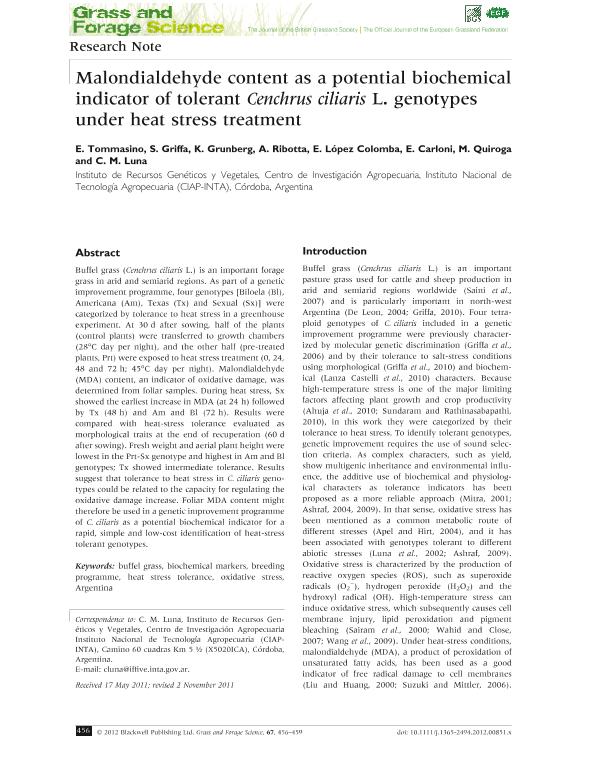Artículo
Malondialdehyde content as a potential biochemical indicator of tolerant Cenchrus ciliaris L. genotypes under heat stress treatment
Tommasino, Exequiel Arturo; Griffa, Sabrina Mariana; Grunberg, Karina Alejandra ; Ribotta, Andrea Noemí; López Colomba, E.; Carloni, Edgardo José; Quiroga, M.; Luna, Celina Mercedes
; Ribotta, Andrea Noemí; López Colomba, E.; Carloni, Edgardo José; Quiroga, M.; Luna, Celina Mercedes
 ; Ribotta, Andrea Noemí; López Colomba, E.; Carloni, Edgardo José; Quiroga, M.; Luna, Celina Mercedes
; Ribotta, Andrea Noemí; López Colomba, E.; Carloni, Edgardo José; Quiroga, M.; Luna, Celina Mercedes
Fecha de publicación:
03/02/2012
Editorial:
Wiley Blackwell Publishing, Inc
Revista:
Grass and Forage Science
ISSN:
0142-5242
e-ISSN:
1365-2494
Idioma:
Inglés
Tipo de recurso:
Artículo publicado
Clasificación temática:
Resumen
Buffel grass (Cenchrus ciliaris L.) is an important forage grass in arid and semiarid regions. As part of a genetic improvement programme, four genotypes [Biloela (Bl), Americana (Am), Texas (Tx) and Sexual (Sx)] were categorized by tolerance to heat stress in a greenhouse experiment. At 30d after sowing, half of the plants (control plants) were transferred to growth chambers (28°C day per night), and the other half (pre-treated plants, Prt) were exposed to heat stress treatment (0, 24, 48 and 72h; 45°C day per night). Malondialdehyde (MDA) content, an indicator of oxidative damage, was determined from foliar samples. During heat stress, Sx showed the earliest increase in MDA (at 24h) followed by Tx (48h) and Am and Bl (72h). Results were compared with heat-stress tolerance evaluated as morphological traits at the end of recuperation (60d after sowing). Fresh weight and aerial plant height were lowest in the Prt-Sx genotype and highest in Am and Bl genotypes; Tx showed intermediate tolerance. Results suggest that tolerance to heat stress in C. ciliaris genotypes could be related to the capacity for regulating the oxidative damage increase. Foliar MDA content might therefore be used in a genetic improvement programme of C. ciliaris as a potential biochemical indicator for a rapid, simple and low-cost identification of heat-stress tolerant genotypes. © 2012 Blackwell Publishing Ltd.
Archivos asociados
Licencia
Identificadores
Colecciones
Articulos(CCT - CORDOBA)
Articulos de CTRO.CIENTIFICO TECNOL.CONICET - CORDOBA
Articulos de CTRO.CIENTIFICO TECNOL.CONICET - CORDOBA
Citación
Tommasino, Exequiel Arturo; Griffa, Sabrina Mariana; Grunberg, Karina Alejandra; Ribotta, Andrea Noemí; López Colomba, E.; et al.; Malondialdehyde content as a potential biochemical indicator of tolerant Cenchrus ciliaris L. genotypes under heat stress treatment; Wiley Blackwell Publishing, Inc; Grass and Forage Science; 67; 3; 3-2-2012; 456-459
Compartir
Altmétricas



